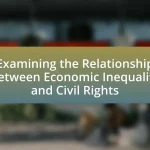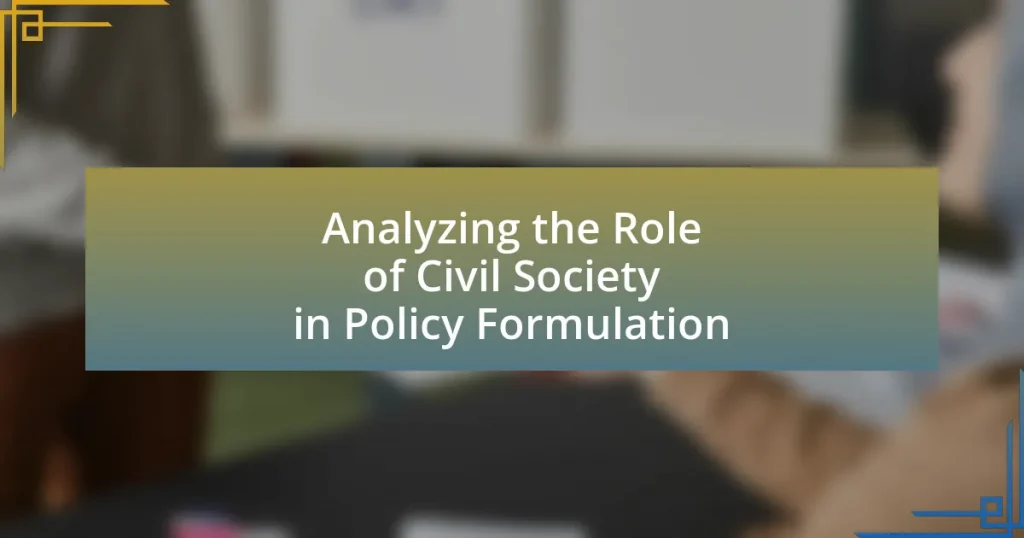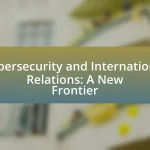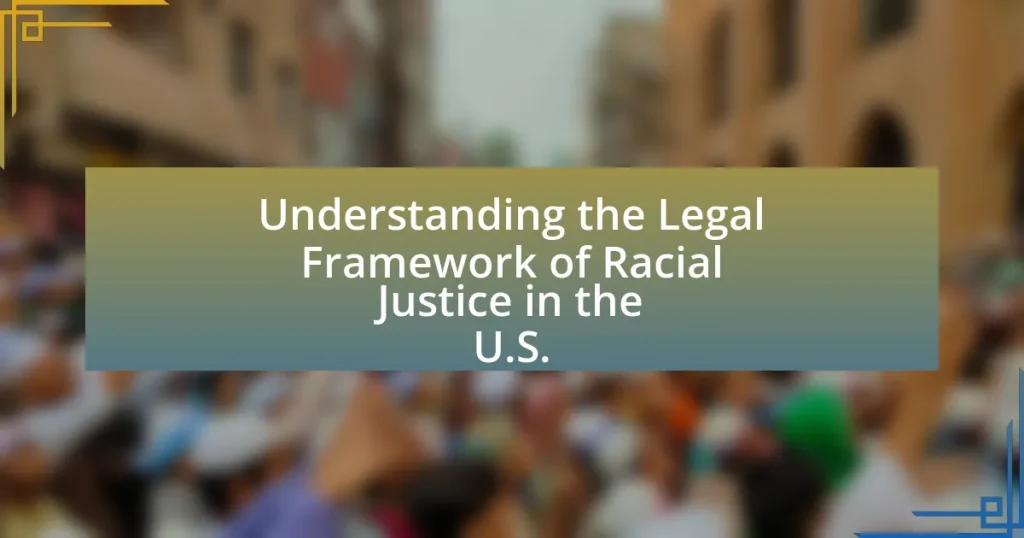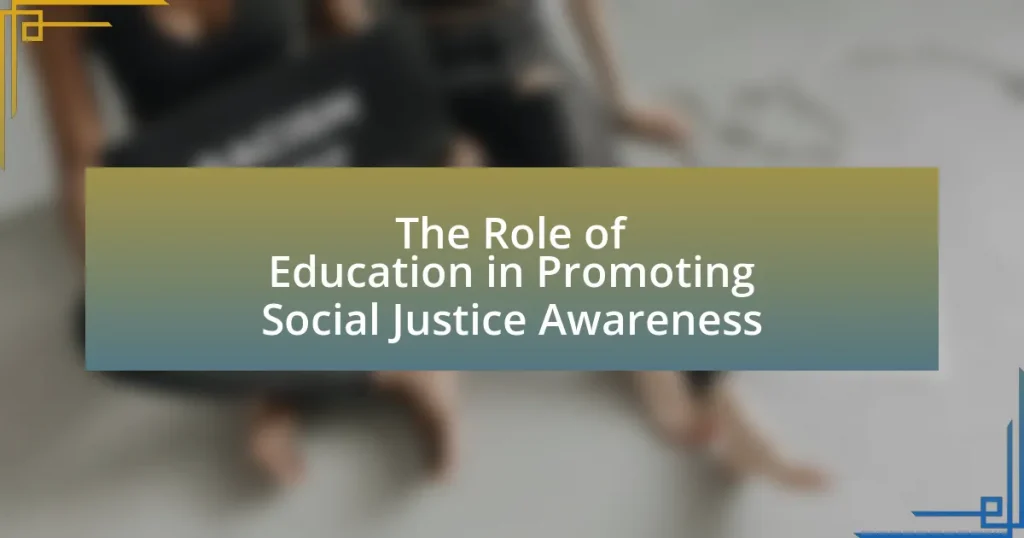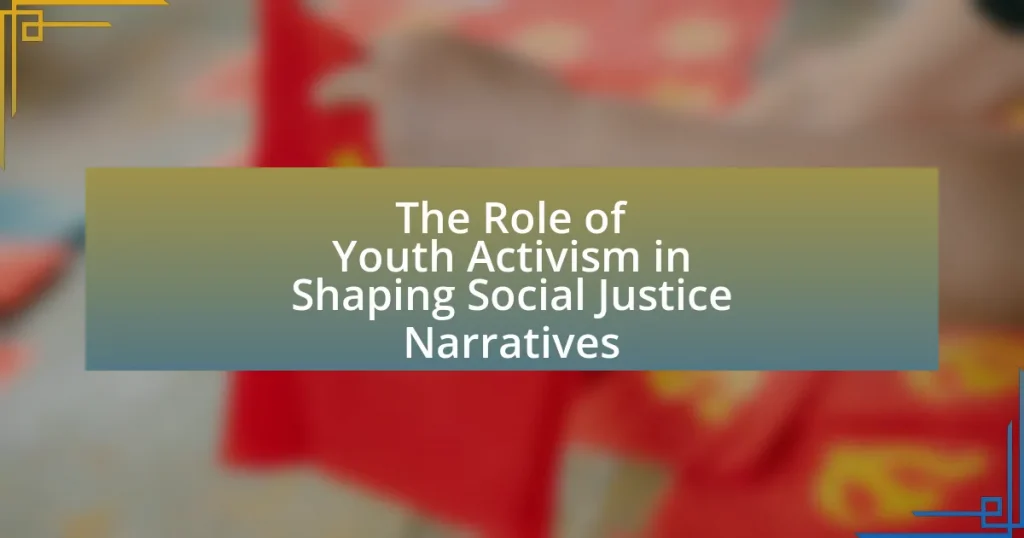The article analyzes the critical role of civil society in policy formulation, highlighting how organizations such as non-governmental organizations (NGOs), advocacy groups, and community-based organizations contribute to shaping public policy. It discusses the mechanisms through which civil society engages with policymakers, including advocacy, public consultations, and partnerships, while emphasizing the importance of public opinion in driving civil society’s actions. Additionally, the article addresses the challenges faced by civil society, such as limited access to decision-makers and funding constraints, and outlines strategies for enhancing their influence in the policy-making process. Finally, it explores future trends, including the impact of technology and emerging social issues, that will shape civil society’s role in governance.
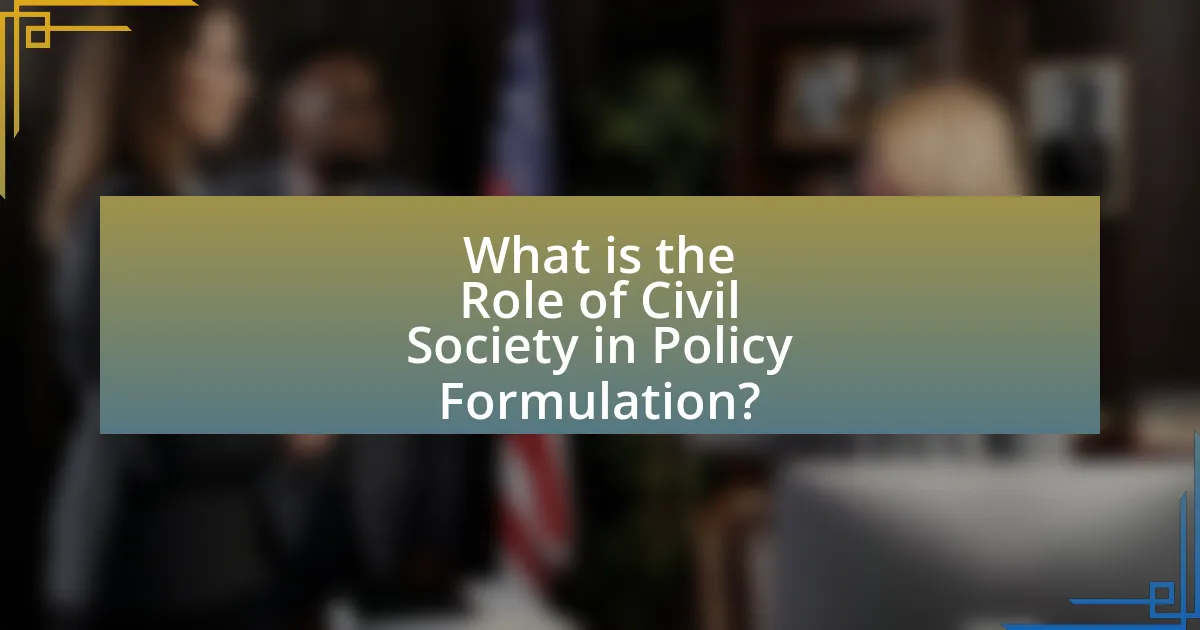
What is the Role of Civil Society in Policy Formulation?
Civil society plays a crucial role in policy formulation by representing diverse interests, advocating for marginalized groups, and providing expertise and data to inform decision-making. Civil society organizations, such as non-governmental organizations (NGOs) and community groups, engage in dialogue with policymakers, ensuring that the voices of citizens are heard and considered in the legislative process. For instance, studies show that countries with active civil societies tend to have more inclusive and responsive policies, as these organizations often conduct research, mobilize public opinion, and hold governments accountable. This engagement not only enhances transparency but also fosters democratic governance by encouraging public participation in policy discussions.
How does civil society influence policy decisions?
Civil society influences policy decisions through advocacy, public engagement, and mobilization of resources. Organizations within civil society, such as non-governmental organizations (NGOs), community groups, and social movements, actively engage in lobbying efforts to shape legislation and policy frameworks. For instance, the Global Partnership for Social Accountability highlights how civil society organizations can enhance government accountability and responsiveness by providing data, expertise, and public opinion to policymakers. Additionally, civil society plays a crucial role in raising awareness about social issues, thereby pressuring governments to address these concerns through policy changes. Research indicates that countries with robust civil societies tend to have more participatory governance structures, leading to more inclusive and effective policy outcomes.
What mechanisms does civil society use to engage with policymakers?
Civil society engages with policymakers through mechanisms such as advocacy, public consultations, and partnerships. Advocacy involves organized efforts to influence policy decisions, often through campaigns that raise awareness about specific issues. Public consultations allow civil society organizations to provide input during the policymaking process, ensuring that diverse perspectives are considered. Partnerships between civil society and government entities facilitate collaborative approaches to policy development, enabling the sharing of resources and expertise. These mechanisms are essential for promoting transparency, accountability, and inclusivity in governance.
How does public opinion shape civil society’s role in policy formulation?
Public opinion significantly shapes civil society’s role in policy formulation by influencing the priorities and actions of civil organizations. When public sentiment strongly favors specific issues, civil society groups often mobilize to advocate for those concerns, thereby amplifying the voices of citizens in the policymaking process. For instance, during the climate change movement, widespread public concern led organizations like Greenpeace and the Sierra Club to push for more stringent environmental policies, demonstrating how public opinion can drive civil society to engage actively with policymakers. This interaction not only reflects the will of the people but also pressures governments to respond to societal needs, thereby enhancing the democratic process.
Why is civil society important in the policy-making process?
Civil society is important in the policy-making process because it represents diverse interests and perspectives, ensuring that policies reflect the needs of the community. Civil society organizations, such as NGOs and advocacy groups, engage in dialogue with policymakers, providing valuable insights and data that can lead to more informed decisions. For instance, studies have shown that countries with active civil societies tend to have more responsive governance and better policy outcomes, as these organizations often mobilize citizens to participate in the democratic process, thereby enhancing accountability and transparency.
What unique perspectives does civil society bring to policy discussions?
Civil society brings diverse perspectives to policy discussions by representing the interests and voices of marginalized groups, fostering inclusivity and accountability. This representation ensures that policies are reflective of the broader population’s needs rather than just those of powerful stakeholders. For instance, organizations like Amnesty International and Oxfam have historically influenced policy by highlighting human rights issues and social inequalities, leading to more equitable policy outcomes. Additionally, civil society often provides expertise and grassroots knowledge that can inform evidence-based policymaking, as seen in various environmental advocacy efforts that have shaped climate policies globally.
How does civil society contribute to democratic governance?
Civil society contributes to democratic governance by fostering citizen engagement, promoting accountability, and advocating for policy changes. Organizations within civil society, such as non-governmental organizations (NGOs) and community groups, mobilize citizens to participate in the political process, thereby enhancing public discourse and representation. For instance, studies show that countries with active civil societies tend to have higher voter turnout and more robust public participation in governance. Additionally, civil society acts as a watchdog, holding government officials accountable and ensuring transparency, which is essential for preventing corruption and abuse of power. Research by the World Bank indicates that strong civil society organizations can lead to improved governance outcomes, as they provide a platform for marginalized voices and influence policy formulation that reflects the needs of diverse populations.
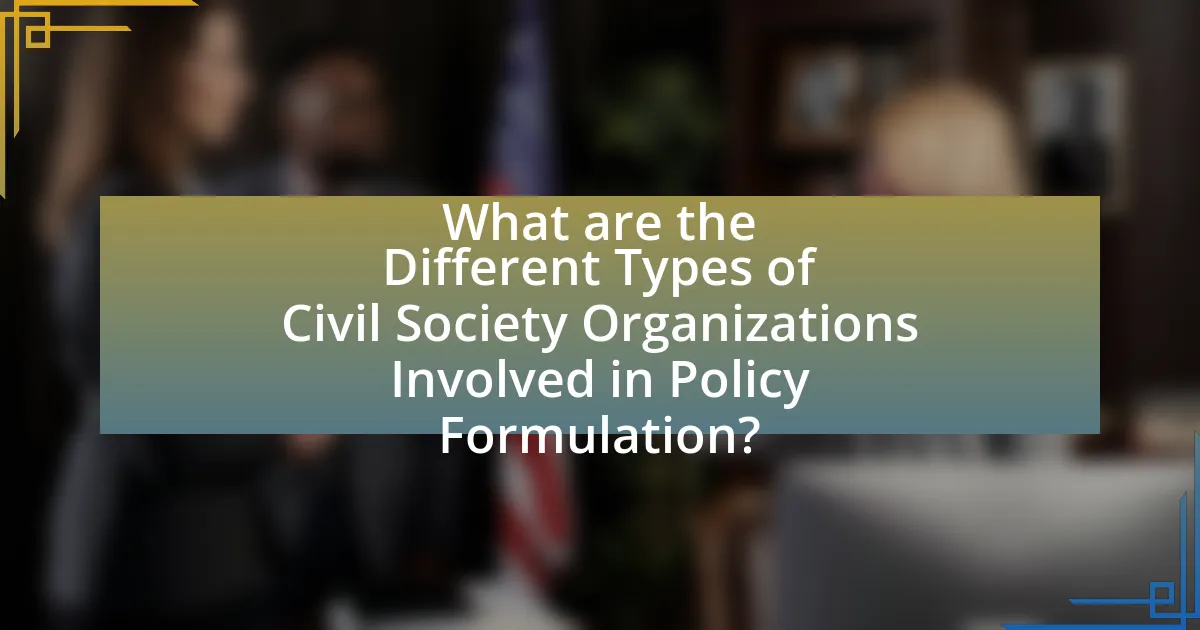
What are the Different Types of Civil Society Organizations Involved in Policy Formulation?
Different types of civil society organizations involved in policy formulation include non-governmental organizations (NGOs), advocacy groups, think tanks, community-based organizations, and professional associations. NGOs often engage in research and advocacy to influence policy decisions, while advocacy groups focus on specific issues, mobilizing public support and lobbying policymakers. Think tanks provide research and analysis to inform policy debates, and community-based organizations represent local interests, ensuring that grassroots perspectives are included in policy discussions. Professional associations contribute expertise and standards relevant to their fields, influencing policy through their specialized knowledge. These organizations collectively play a crucial role in shaping public policy by providing information, representing diverse interests, and facilitating public engagement.
What roles do non-governmental organizations (NGOs) play in policy advocacy?
Non-governmental organizations (NGOs) play critical roles in policy advocacy by influencing decision-making processes, raising public awareness, and representing marginalized voices. They engage in research and analysis to provide evidence-based recommendations to policymakers, thereby shaping legislative agendas. For instance, NGOs like Amnesty International and Human Rights Watch have successfully campaigned for human rights reforms by mobilizing public opinion and lobbying government officials. Their ability to gather data and present compelling narratives enhances their credibility and effectiveness in advocating for policy changes.
How do grassroots movements influence local policy changes?
Grassroots movements influence local policy changes by mobilizing community members to advocate for specific issues, thereby creating pressure on local governments to respond. These movements often utilize strategies such as organizing protests, conducting awareness campaigns, and engaging in direct dialogue with policymakers. For instance, the 2011 Occupy Wall Street movement raised awareness about economic inequality, prompting local governments to consider policies addressing wealth distribution. Additionally, research by the Stanford Social Innovation Review indicates that grassroots organizations can effectively shape public opinion, leading to increased political engagement and policy reform at the local level.
What is the impact of think tanks on policy formulation?
Think tanks significantly influence policy formulation by providing research, analysis, and expert recommendations that shape governmental decisions. They serve as intermediaries between academia, government, and the public, translating complex data into actionable policy insights. For instance, a study by the Brookings Institution found that think tanks contributed to the development of key policies in areas such as healthcare and education reform, demonstrating their role in informing legislative agendas. Additionally, think tanks often engage in advocacy, mobilizing public opinion and lobbying for specific policy outcomes, which further underscores their impact on the policymaking process.
How do community-based organizations contribute to policy development?
Community-based organizations contribute to policy development by advocating for the needs and interests of local populations, thereby influencing decision-makers. These organizations gather data on community issues, mobilize residents, and create platforms for dialogue, which helps to articulate specific policy recommendations. For instance, research by the National Council of Nonprofits highlights that community-based organizations often serve as intermediaries between citizens and government, ensuring that marginalized voices are heard in the policy-making process. This engagement leads to more informed and responsive policies that reflect the actual needs of the community.
What strategies do these organizations use to mobilize community support?
Organizations mobilize community support through strategies such as grassroots organizing, coalition building, and targeted communication campaigns. Grassroots organizing involves engaging community members directly, fostering local leadership, and encouraging participation in decision-making processes. Coalition building allows organizations to unite various stakeholders, amplifying their collective voice and resources to advocate for shared goals. Targeted communication campaigns utilize social media, public events, and informational materials to raise awareness and educate the community about specific issues, thereby increasing public engagement and support. These strategies have been effective in various contexts, as evidenced by successful movements that have led to policy changes and increased civic participation.
How do they ensure that marginalized voices are heard in policy discussions?
They ensure that marginalized voices are heard in policy discussions by actively engaging these communities through inclusive consultation processes. Civil society organizations often facilitate forums, workshops, and surveys specifically designed to gather input from underrepresented groups, ensuring their perspectives are integrated into policy formulation. For instance, the United Nations emphasizes the importance of participatory governance, which includes mechanisms for marginalized populations to contribute to decision-making, thereby enhancing the legitimacy and effectiveness of policies.
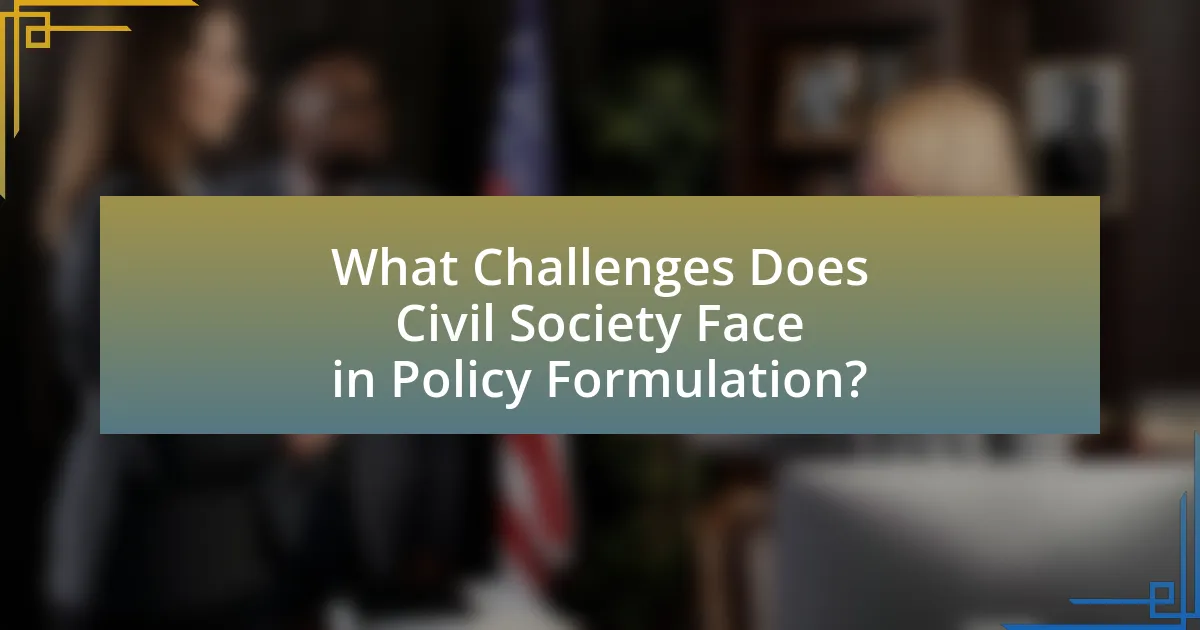
What Challenges Does Civil Society Face in Policy Formulation?
Civil society faces several challenges in policy formulation, including limited access to decision-makers, insufficient funding, and a lack of representation in political processes. Limited access to decision-makers hinders civil society organizations from effectively influencing policy discussions, as they often lack the networks or resources to engage with government officials. Insufficient funding restricts their ability to conduct research, mobilize communities, and advocate for policy changes, which is critical for effective participation. Additionally, a lack of representation in political processes means that the voices of marginalized groups are often overlooked, leading to policies that do not reflect the needs of the broader population. These challenges collectively undermine the capacity of civil society to contribute meaningfully to policy formulation.
What barriers hinder civil society’s effectiveness in influencing policy?
Barriers that hinder civil society’s effectiveness in influencing policy include limited access to decision-makers, lack of resources, and restrictive legal frameworks. Limited access to decision-makers prevents civil society organizations from effectively presenting their viewpoints and recommendations, as they often lack the connections or platforms to engage with policymakers directly. Additionally, many civil society organizations operate with constrained financial and human resources, which limits their capacity to conduct research, mobilize support, and advocate effectively. Restrictive legal frameworks, such as laws that limit freedom of assembly or expression, further inhibit civil society’s ability to organize and advocate for policy changes. These barriers collectively diminish the impact of civil society on policy formulation and implementation.
How do political environments affect civil society’s engagement in policy formulation?
Political environments significantly influence civil society’s engagement in policy formulation by determining the level of openness, restrictions, and opportunities for participation. In democratic settings, civil society organizations often have greater access to policymakers and can actively contribute to discussions, leading to more inclusive and representative policy outcomes. Conversely, in authoritarian regimes, civil society may face repression, limiting their ability to engage effectively in policy processes. For instance, research by the World Bank indicates that in countries with higher levels of political freedom, civil society organizations are more likely to influence policy decisions, as seen in the case of participatory budgeting initiatives in Brazil. This demonstrates that the political context directly shapes the capacity and willingness of civil society to engage in meaningful policy formulation.
What role does funding play in the sustainability of civil society organizations?
Funding is crucial for the sustainability of civil society organizations as it provides the necessary resources to operate, implement programs, and achieve their missions. Without adequate funding, these organizations struggle to maintain staff, deliver services, and engage in advocacy efforts. For instance, a study by the World Bank indicates that civil society organizations with diversified funding sources are more resilient and capable of adapting to changing political and economic environments. This financial support enables them to foster community engagement, influence policy decisions, and sustain their activities over time, thereby reinforcing their role in policy formulation.
How can civil society overcome these challenges?
Civil society can overcome challenges by fostering collaboration among diverse stakeholders, including government, private sector, and community organizations. This collaboration enhances resource sharing, knowledge exchange, and collective action, which are essential for addressing complex social issues. For instance, successful initiatives like the Global Partnership for Effective Development Cooperation demonstrate how multi-stakeholder partnerships can lead to more effective policy outcomes. By leveraging their unique strengths and perspectives, civil society organizations can influence policy formulation and implementation, ensuring that the voices of marginalized communities are heard and considered.
What best practices can civil society adopt to enhance their influence?
Civil society can enhance its influence by adopting strategic advocacy, building coalitions, and leveraging data-driven approaches. Strategic advocacy involves clearly defining objectives and tailoring messages to resonate with policymakers, which has been shown to increase engagement and support for civil society initiatives. Building coalitions with diverse stakeholders amplifies voices and resources, as evidenced by successful campaigns like the Global Fund to Fight AIDS, Tuberculosis and Malaria, which united various organizations to influence health policy. Leveraging data-driven approaches, such as utilizing research and statistics to support claims, strengthens arguments and demonstrates the impact of proposed policies, thereby increasing credibility and influence in policy formulation.
How can collaboration with other stakeholders improve policy outcomes?
Collaboration with other stakeholders can significantly improve policy outcomes by integrating diverse perspectives and expertise, which leads to more comprehensive and effective solutions. When various stakeholders, including government agencies, non-profit organizations, and community groups, work together, they can identify and address the multifaceted nature of social issues more effectively. For instance, a study by the World Bank found that participatory approaches in policy-making, which involve collaboration with civil society, result in policies that are more responsive to the needs of the community and have higher rates of implementation success. This collaborative process fosters trust, enhances transparency, and encourages shared ownership of policy initiatives, ultimately leading to better alignment of policies with the actual needs and priorities of the population.
What are the Future Trends for Civil Society in Policy Formulation?
Future trends for civil society in policy formulation include increased digital engagement, enhanced collaboration with governmental bodies, and a focus on data-driven advocacy. Digital platforms enable civil society organizations to mobilize support and influence policy decisions more effectively, as seen in movements like the Arab Spring, where social media played a crucial role in organizing protests and shaping public discourse. Collaboration with governments is becoming more common, with initiatives like participatory budgeting allowing civil society to directly influence resource allocation. Additionally, the use of big data and analytics in advocacy efforts is on the rise, as organizations leverage evidence-based approaches to support their policy positions, exemplified by the work of organizations like the World Resources Institute, which utilizes data to inform environmental policy.
How is technology changing the landscape for civil society engagement?
Technology is transforming civil society engagement by enhancing communication, increasing accessibility, and facilitating collaboration. Digital platforms enable organizations to reach broader audiences, mobilize support quickly, and engage in real-time discussions. For instance, social media has become a vital tool for advocacy, allowing civil society groups to share information and organize campaigns effectively. According to a 2021 report by the International Civil Society Centre, 70% of civil society organizations reported increased engagement through digital tools during the COVID-19 pandemic, demonstrating technology’s role in maintaining and expanding civic participation.
What emerging issues are likely to shape civil society’s role in the future?
Emerging issues likely to shape civil society’s role in the future include digital governance, climate change activism, and social inequality. Digital governance is transforming how civil society organizations engage with citizens and policymakers, as technology facilitates greater transparency and participation. For instance, the rise of social media has enabled grassroots movements to mobilize quickly and effectively, influencing policy decisions on issues like climate change. Climate change activism is increasingly pressing, with civil society playing a crucial role in advocating for sustainable policies and holding governments accountable. Additionally, social inequality, exacerbated by economic disparities and systemic injustices, compels civil society to address these challenges through advocacy and community support initiatives. These factors collectively underscore the evolving landscape in which civil society operates, necessitating adaptive strategies to remain effective in policy formulation.
What Practical Strategies Can Civil Society Use to Enhance Their Impact on Policy Formulation?
Civil society can enhance their impact on policy formulation by employing strategies such as advocacy, coalition building, and evidence-based research. Advocacy allows civil society organizations to raise awareness and influence public opinion, which is crucial for shaping policy agendas. Coalition building fosters collaboration among diverse groups, amplifying their collective voice and increasing their leverage in negotiations with policymakers. Evidence-based research provides credible data and insights that can inform policy decisions, making it essential for civil society to engage in rigorous analysis and present findings to stakeholders. For instance, organizations like the Center for American Progress have successfully utilized these strategies to influence healthcare policy in the United States, demonstrating the effectiveness of a coordinated approach in policy advocacy.









